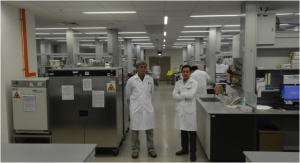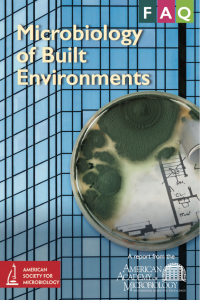In the context of an Alfred P. Sloan Foundation grant to the UNITE database to improve the support for fungi in the built environment, a workshop centered on public fungal ITS (barcode) sequences from the built environment was organized in Gothenburg, Sweden on May 23-24, 2016. Specifically, the ~40 physical and remote workshop participants sought …
Microbes in the house Urban Dust Microbiome: Impact on Later Atopy and Wheezing – Christina Tischer – Environmental Health Perspectives (OA) Investigations in urban areas have just begun to explore how the indoor dust microbiome may affect the pathogenesis of asthma and allery. We aimed to investigate the early fungal and bacterial microbiome in house dust …
This is a guest post from Dr. Koh Tse Hsien who maintains the blog Microcosm and also is in the Pathology Department at Singapore General Hospital. Clinical microbiology and social media We are a diagnostic laboratory that provides bacteriology services to a busy 1600-bedded tertiary care hospital in Singapore (http://www.sgh.com.sg). We receive about 360,000 specimens a year. …
Back in November, I posted about a superbug that emerged in China. The mcr-1 gene is known to be resistant to Colistin, a last resort antibiotic for superbug infections. Today, the first known case of the resistant strain of E. coli was reported here in the US (Pennsylvania). This is scary for many reasons and …
Over the last several years our lab has spent a fair bit of effort on collecting and sequencing genomes of bacteria from the built environment. Genome sequences are useful for a number of reasons including facilitating metagenomics and understanding the actual metabolic capacity of particular microbes. In particular we hope that genome sequences will facilitate …
About half the human population now lives in urban environments. In 2008, populations of more developed nations were about 74% urban, while about 44% of residents of less developed countries lived in urban areas. It is projected that 70% of the world population will be urban by 2050, with most urban growth occurring in less developed countries. While there …
Recent papers on microbes of the built environment. Microbes in the hospital Prevalence of Staphylococcus aureus from nares and hands on healthcare professionals in a Portuguese Hospital – Ana Castro – Journal of Applied Microbiology ($6 to rent, $38 to own) The main goal was to estimate the prevalence of methicillin-resistant S. aureus on hands and …
Hello everyone! I’d like to draw your attention to our just published year-long study focusing on little investigated topic titled: “Concentrations and sources of airborne particles in a neonatal intensive care unit”. The main outcomes of the study are the following: The contribution of outdoor particles to indoor particle mass concentrations was particularly low owing …
There is a report out from the American Academy of Microbiology that is based on the “Microbiology of the Built Environment” colloquium they hosted in September 2015. The report summary is below: Built environments are the structures that humans create to shelter from the outdoors and provide spaces for living, working, playing, and getting places. …
Urban Metagenomics International Meeting Coming Soon! We are accepting abstracts and poster proposals for the 2016 MetaSUB Consortium Meeting (Metagenomics and Metadesign of Subways and Urban Biomes) until May 30. For details, please see our EventBrite Page here. The meeting takes place at Fudan University in Shanghai, China on July 1-2. Registration for the International …


